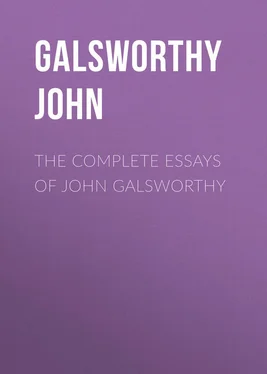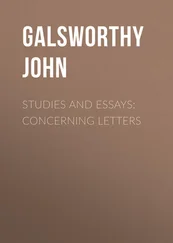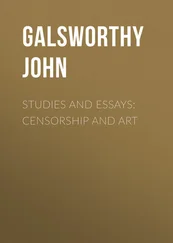John Galsworthy - The Complete Essays of John Galsworthy
Здесь есть возможность читать онлайн «John Galsworthy - The Complete Essays of John Galsworthy» — ознакомительный отрывок электронной книги совершенно бесплатно, а после прочтения отрывка купить полную версию. В некоторых случаях можно слушать аудио, скачать через торрент в формате fb2 и присутствует краткое содержание. Жанр: foreign_antique, foreign_prose, на английском языке. Описание произведения, (предисловие) а так же отзывы посетителей доступны на портале библиотеки ЛибКат.
- Название:The Complete Essays of John Galsworthy
- Автор:
- Жанр:
- Год:неизвестен
- ISBN:нет данных
- Рейтинг книги:5 / 5. Голосов: 1
-
Избранное:Добавить в избранное
- Отзывы:
-
Ваша оценка:
- 100
- 1
- 2
- 3
- 4
- 5
The Complete Essays of John Galsworthy: краткое содержание, описание и аннотация
Предлагаем к чтению аннотацию, описание, краткое содержание или предисловие (зависит от того, что написал сам автор книги «The Complete Essays of John Galsworthy»). Если вы не нашли необходимую информацию о книге — напишите в комментариях, мы постараемся отыскать её.
The Complete Essays of John Galsworthy — читать онлайн ознакомительный отрывок
Ниже представлен текст книги, разбитый по страницам. Система сохранения места последней прочитанной страницы, позволяет с удобством читать онлайн бесплатно книгу «The Complete Essays of John Galsworthy», без необходимости каждый раз заново искать на чём Вы остановились. Поставьте закладку, и сможете в любой момент перейти на страницу, на которой закончили чтение.
Интервал:
Закладка:
Then, out of the heart of that dusky whiteness, came a tiny sound; we stood, not breathing, turning our heads. I could see the mare’s eye fixed and straining at the vapour. The tiny sound grew till it became the muttering of wheels. The mare dashed forward. The muttering ceased untimely; but she did not stop; turning abruptly to the left, she slid, scrambled, and dropped into a trot. The mist seemed whiter below us; we were on the road. And involuntarily there came from me a sound, not quite a shout, not quite an oath. I saw the mare’s eye turn back, faintly derisive, as who should say: Alone I did it! Then slowly, comfortably, a little ashamed, we jogged on, in the mood of men and horses when danger is over. So pleasant it seemed now, in one short half-hour, to have passed through the circle-swing of the emotions, from the ecstasy of hot recklessness to the clutching of chill fear. But the meeting-point of those two sensations we had left out there on the mysterious moor! Why, at one moment, had we thought it finer than anything on earth to risk the breaking of our necks; and the next, shuddered at being lost in the darkening mist with winter night fast coming on?
And very luxuriously we turned once more into the lanes, enjoying the past, scenting the future. Close to home, the first little eddy of wind stirred, and the song of dripping twigs began; an owl hooted, honey-soft, in the fog. We came on two farm hands mending the lane at the turn of the avenue, and, curled on the top of the bank, their cosy red collie pup, waiting for them to finish work for the day. He raised his sharp nose and looked at us dewily. We turned down, padding softly in the wet fox-red drifts under the beechtrees, whereon the last leaves still flickered out in the darkening whiteness, that now seemed so little eerie. We passed the grey-green skeleton of the farm-yard gate. A hen ran across us, clucking, into the dusk. The maze drew her long, home-coming snuffle, and stood still.
1910.
THE PROCESSION
In one of those corners of our land canopied by the fumes of blind industry, there was, on that day, a lull in darkness. A fresh wind had split the customary heaven, or roof of hell; was sweeping long drifts of creamy clouds across a blue still pallid with reek. The sun even shone – a sun whose face seemed white and wondering. And under that rare sun all the little town, among its slag heaps and few tall chimneys, had an air of living faster. In those continuous courts and alleys, where the women worked, smoke from each little forge rose and dispersed into the wind with strange alacrity; amongst the women, too, there was that same eagerness, for the sunshine had crept in and was making pale all those dark-raftered, sooted ceilings which covered them in, together with their immortal comrades, the small open furnaces. About their work they had been busy since seven o’clock; their feet pressing the leather lungs which fanned the conical heaps of glowing fuel, their hands poking into the glow a thin iron rod till the end could be curved into a fiery hook; snapping it with a mallet; threading it with tongs on to the chain; hammering, closing the link; and; without a second’s pause, thrusting the iron rod again into the glow. And while they worked they chattered, laughed sometimes, now and then sighed. They seemed of all ages and all types; from her who looked like a peasant of Provence, broad, brown, and strong, to the weariest white consumptive wisp; from old women of seventy, with straggling grey hair, to fifteen-year-old girls. In the cottage forges there would be but one worker, or two at most; in the shop forges four, or even five, little glowing heaps; four or five of the grimy, pale lung-bellows; and never a moment without a fiery hook about to take its place on the growing chains, never a second when the thin smoke of the forges, and of those lives consuming slowly in front of them, did not escape from out of the dingy, whitewashed spaces past the dark rafters, away to freedom.
But there had been in the air that morning something more than the white sunlight. There had been anticipation. And at two o’clock began fulfilment. The forges were stilled, and from court and alley forth came the women. In their ragged working clothes, in their best clothes – so little different; in bonnets, in hats, bareheaded; with babies born and unborn, they swarmed into the high street and formed across it behind the band. A strange, magpie, jay-like flock; black, white, patched with brown and green and blue, shifting, chattering, laughing, seeming unconscious of any purpose. A thousand and more of them, with faces twisted and scored by those myriad deformings which a desperate town-toiling and little food fasten on human visages; yet with hardly a single evil or brutal face. Seemingly it was not easy to be evil or brutal on a wage that scarcely bound soul and body. A thousand and more of the poorest-paid and hardest-worked human beings in the world.
On the pavement alongside this strange, acquiescing assembly of revolt, about to march in protest against the conditions of their lives, stood a young woman without a hat and in poor clothes, but with a sort of beauty in her rough-haired, high cheek-boned, dark-eyed face. She was not one of them; yet, by a stroke of Nature’s irony, there was graven on her face alone of all those faces, the true look of rebellion; a haughty, almost fierce, uneasy look – an untamed look. On all the other thousand faces one could see no bitterness, no fierceness, not even enthusiasm; only a half-stolid, half-vivacious patience and eagerness as of children going to a party.
The band played; and they began to march.
Laughing, talking, waving flags, trying to keep step; with the same expression slowly but surely coming over every face; the future was not; only the present – this happy present of marching behind the discordance of a brass band; this strange present of crowded movement and laughter in open air.
We others – some dozen accidentals like myself, and the tall, grey-haired lady interested in “the people,” together with those few kind spirits in charge of “the show” – marched too, a little self-conscious, desiring with a vague military sensation to hold our heads up, but not too much, under the eyes of the curious bystanders. These – nearly all men – were well-wishers, it was said, though their faces, pale from their own work in shop or furnace, expressed nothing but apathy. They wished well, very dumbly, in the presence of this new thing, as if they found it queer that women should be doing something for themselves; queer and rather dangerous. A few, indeed, shuffled along between the column and the little hopeless shops and grimy factory sheds, and one or two accompanied their women, carrying the baby. Now and then there passed us some better-to-do citizen-a housewife, or lawyer’s clerk, or ironmonger, with lips pressed rather tightly together and an air of taking no notice of this disturbance of traffic, as though the whole thing were a rather poor joke which they had already heard too often.
So, with laughter and a continual crack of voices our jay-like crew swung on, swaying and thumping in the strange ecstasy of irreflection, happy to be moving they knew not where, nor greatly why, under the visiting sun, to the sound of murdered music. Whenever the band stopped playing, discipline became as tatterdemalion as the very flags and garments; but never once did they lose that look of essential order, as if indeed they knew that, being the worst-served creatures in the Christian world, they were the chief guardians of the inherent dignity of man.
Hatless, in the very front row, marched a tall slip of a girl, arrow-straight, and so thin, with dirty fair hair, in a blouse and skirt gaping behind, ever turning her pretty face on its pretty slim neck from side to side, so that one could see her blue eyes sweeping here, there, everywhere, with a sort of flower-like wildness, as if a secret embracing of each moment forbade her to let them rest on anything and break this pleasure of just marching. It seemed that in the never-still eyes of that anaemic, happy girl the spirit of our march had elected to enshrine itself and to make thence its little excursions to each ecstatic follower. Just behind her marched a little old woman – a maker of chains, they said, for forty years – whose black slits of eyes were sparkling, who fluttered a bit of ribbon, and reeled with her sense of the exquisite humour of the world. Every now and then she would make a rush at one of her leaders to demonstrate how immoderately glorious was life. And each time she spoke the woman next to her, laden with a heavy baby, went off into squeals of laughter. Behind her, again, marched one who beat time with her head and waved a little bit of stick, intoxicated by this noble music.
Читать дальшеИнтервал:
Закладка:
Похожие книги на «The Complete Essays of John Galsworthy»
Представляем Вашему вниманию похожие книги на «The Complete Essays of John Galsworthy» списком для выбора. Мы отобрали схожую по названию и смыслу литературу в надежде предоставить читателям больше вариантов отыскать новые, интересные, ещё непрочитанные произведения.
Обсуждение, отзывы о книге «The Complete Essays of John Galsworthy» и просто собственные мнения читателей. Оставьте ваши комментарии, напишите, что Вы думаете о произведении, его смысле или главных героях. Укажите что конкретно понравилось, а что нет, и почему Вы так считаете.












